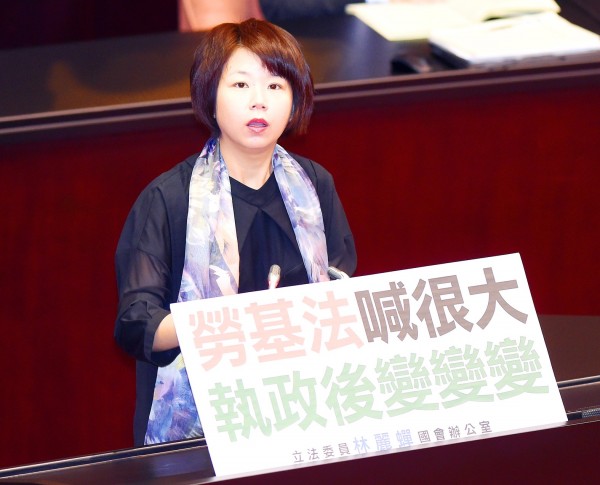《TAIPEI TIMES》 Lawmakers pan labor proposals

Chinese National Party (KMT) Legislator Lin Li-chan speaks at the legislature in Taipei yesterday, holding a sign accusing the Democratic Progressive Party of protesting loudly against the Labor Standards Act amendments while still in opposition, but changing its tune after taking office. Photo: Liao Chen-huei, Taipei Times
GENEROUS TO EMPLOYERS: Legislators said proposed amendments to labor regulations rely on employee-employer agreements, but less than 7 percent of workers are unionized
By Sean Lin / Staff reporter
The Ministry of Labor’s draft amendments to the Labor Standards Act (勞動基準法) have drawn criticism within the governing party, with several Democratic Progressive Party (DPP) lawmakers publicly challenging the proposals.
During a legislative question-and-answer session on Thursday, DPP Legislator Chung Kung-chao (鍾孔炤), a former labor rights activist, put up a placard reading “dumbfounded by tremendous sadness” and stood behind the podium in silence for six minutes until his time was up when it was his turn to question officials about the proposed amendments,.
The placard depicted a government official nodding “yes” to a fat man sitting on a big sack of money, while shaking his head “no” to a group of protesters demanding dignity for workers.
The fat man is playing with blocks, building a castle with beams and pillars reading “low pay,” “overwork,” “cheap land and utilities” and a pinnacle labeled “subsidies.”
Officials who had worked on the proposed amendments, including Chung’s former colleague at the Taiwan Labor Front, Deputy Minister of Labor Liao Huei-fang (廖蕙芳), looked on in dismay.
Chung’s office issued a statement saying that her move was meant to portray ordinary workers who have been deprived of their voice by their employers, as they do not have a say in the proposed amendments.
DPP Legislator Lin Shu-fen (林淑芬) also panned the draft amendments, calling them ludicrous.
According to the proposed amendments, companies that want to increase employees’ monthly overtime quota from 46 to 54 hours; reduce their rest time between shifts from 11 to eight hours or make them work 12 days in a row by moving days off may do so after gaining the consent of unions or employees through negotiations.
The legal stipulations are flawed, as negotiations between employers and employees, a tier-seven legal tool, should not override a tier-two act, Lin said.
“Deputy Minister Liao, you come from a legal background. Please do not be ridiculous,” Lin said.
Lin said that there are more than 1 million companies nationwide, but only about 70,000 have held meetings with their employees, citing her own research.
In addition, conclusions reached during such meetings are often falsified, and regulations following from such meetings are often rigid and in some cases have not been amended for decades, she said.
Lin was equally dismissive of the proposal to allow workers to be made to work 12 days in a row, saying that as a lawmaker paid handsomely by taxpayers, she could probably live with the “12 on, two off” schedule for several months.
“But if you would want me to adhere to such a schedule for 10 or 20 years, and forgo my family life and time to meet my friends, do you think I could accept that?” Lin asked.
The proposed amendments are overly generous to employers, as even the Taipei-based Chinese National Federation of Industries has asked for increased flexibility in select sectors, such as transportation and nursing, rather than indiscriminate easing of working hour restrictions across the spectrum, she said.
DPP Legislator Chiang Yung-chang (江永昌) said that despite President Tsai Ing-wen’s (蔡英文) policy of encouraging workers to form unions, progress has been slow since the DPP administration took office on May 20 last year.
Less than 7 percent of workers are protected by unions, making employees vulnerable considering the way the amendments have been drafted, Chiang said.
新聞來源:TAIPEI TIMES















